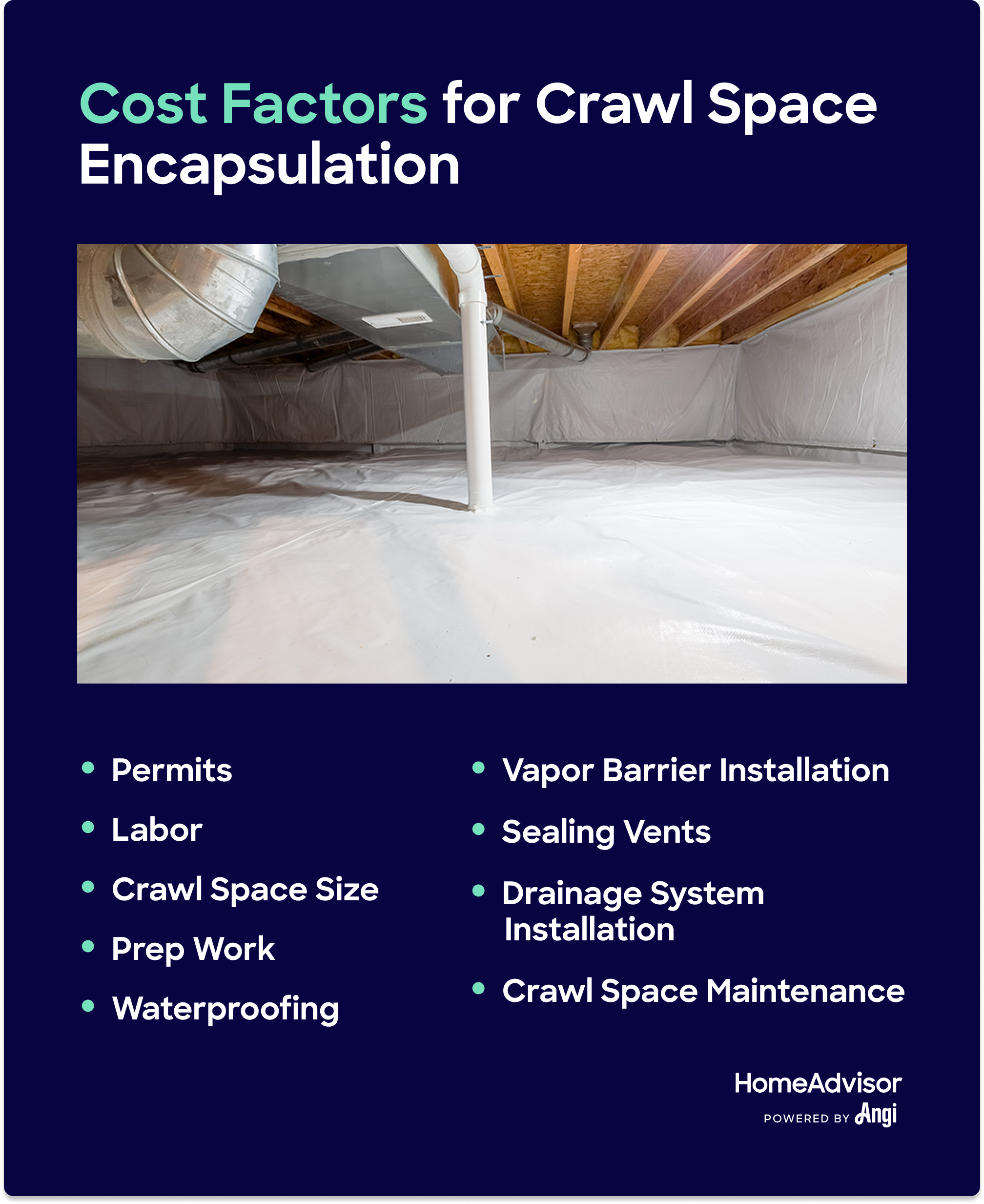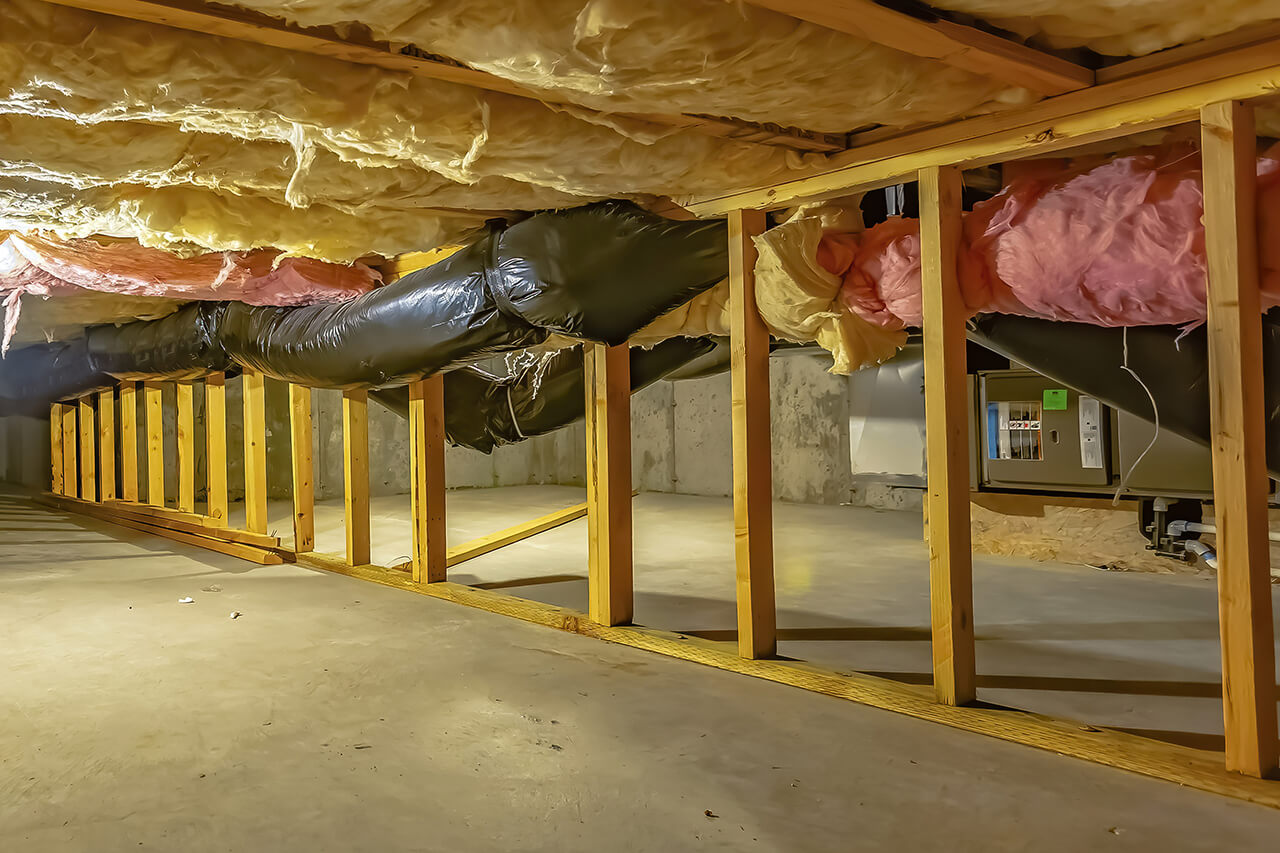How Much Does It Cost To Encapsulate A Crawl Space?
Typical Range:
$1,500 - $15,000
Typical Range:
$1,500 - $15,000
Cost data is based on research by HomeAdvisor.
Updated October 19, 2022
Written by HomeAdvisor.Installing a crawl space encapsulation typically costs $1,500 to $15,000, with an average price of $5,500. These costs include tools, materials, and labor, and they vary depending on the size and condition of the crawl space, complexity of the system, labor rates, and materials used during the installation.
For instance, encapsulation systems consisting of a thin, single-layer plastic liner are much less costly than specially designed systems with thick liners, multilayer vapor barriers, dehumidifiers, sump pumps, drainage trenches, and other added features.
Humid parts of the home, such as crawl spaces, are at an elevated risk for moisture damage over time, which leads to foundational damage and impacts the home's stability. Crawl space encapsulation systems keep the floor system dry by blocking humidity and keeping moisture levels low.
There are various ways to encapsulate a space, but it typically involves contractors sealing the interior of a crawl space and the underside of the house to keep moisture out of floor joists and subflooring.
There are plenty of encapsulation methods and cost factors that impact the overall price of the project. We discuss each significant cost factor in detail below.
In many cases, permits are required for crawl space encapsulation projects, as incorrect installations negatively impact the home's structure and stability. Acquiring a permit for this job costs around $100 to $250, depending on where you live and the job's complexity. Most professional encapsulation system installers handle these permits as part of the work, and the overall price reflects permit fees.
Local waterproofing contractors typically charge $30 to $100 per hour, but most pros charge by the job. Depending on the materials needed and how long installation takes, you'll pay around $3 to $7 per square foot for this job. It's relatively difficult for average homeowners to know if they even need crawl space encapsulation services, but most contractors offer free inspections before being given the go-ahead to perform the installation. If the inspections aren't free, you'll pay for one hour of labor.
The size of your crawl space impacts the cost, as larger areas require more materials and labor. Larger crawl spaces can go up to $15,000, while smaller crawl spaces of around 1,000 square feet cost between $5,500 and $7,500. Measure the square footage of your crawl space before gathering estimates for more accuracy as you plan out your budget and talk to contractors.
Before a crawl space is sealed, it must be accessible and free from debris and mold, with ample structural integrity. Before your pro arrives, clear out the space of furniture, appliances, storage boxes, and oversized items. After that, give it a good cleaning or pay for the cost of cleaning crawl spaces by hiring a pro to do it for you.
Technicians are trained to find mold and structural issues at the point of inspection. If they find evidence of either problem, they'll recommend hiring a mold remediation expert or foundational repair contractor before proceeding with the job.
Each crawl space and foundation is different, with unique encapsulation and waterproofing needs. If your pro finds various leaks or cracks during the inspection process, waterproofing the foundation costs around $4,500 for the project. This price varies depending on the specific demands of your foundation.
For instance, small projects cost as little as $600, but more complicated waterproofing jobs that require drain tiles, gutters, and other installations can cost $10,000 or more. Insulation also assists with waterproofing, with batt insulation installation costing an average of $300 and installing spray foam insulation costing around $1,320 to $3,900.
The vapor barrier is an important element of any crawl space encapsulation project, as this plastic sheet prevents humidity and moisture from contacting the underside of the home. A crawl space vapor barrier costs around $0.50 to $0.70 per square foot, depending on the materials used during construction and the barrier thickness. The thicker the barrier, the higher the cost, with barriers ranging from 6 to 23 millimeters in thickness.
Vapor barriers are affixed via specialized tape that costs around $50 for a 4-inch-by-180-foot roll. Labor costs vary depending on the size and condition of the space, with most quotes including both labor and materials.
Crawl space vents are sealed during most encapsulation projects, as this helps assist with keeping the space dry. Contractors also seal up any gaps and air leaks throughout the space with insulation during this process. Crawl space vent covers are relatively budget-friendly, costing about $15 to $22 each, with crawl spaces requiring one vent cover for 150 square feet of interior space.
Air conditioning from inside the home also helps keep the area dry. When an existing HVAC duct system is present, installing additional vents throughout the crawl space greatly assists with regulating moisture levels. On the other hand, vent or new ductwork installation costs around $450 to $2,000.
Encapsulation keeps humidity from the underside of your home but does nothing to prevent liquids from pooling around the bottom of the foundation if you live in an area with a high water table. For that, install a sump pump to collect the water and send it away, which keeps your foundation sturdy and prevents your walls from shifting. Installing a sump pump costs around $1,300, with a typical range of $650 to $1,800. Some sump pumps include additional features that drive up the price, such as submersible designs, built-in floor drains, and alarm systems to alert homeowners when a leak occurs.
A quality encapsulation system lasts 15 to 20 years, as long as you follow proper maintenance guidelines. Keep the area clean and try to limit moisture of any kind from entering the crawl space or coming into contact with any foundational elements. If you notice mold or mildew growth, hire a pro to handle it immediately before it spreads.
Another way to ensure your encapsulation system lasts a long time is to install a heavy-duty dehumidifier. Installing a dehumidifier costs between $1,300 and $2,800. Unlike household units, professional-grade dehumidifiers are large and built for higher moisture levels.
While many encapsulation materials are available from home improvement centers or online, exercise caution when going the DIY route with this type of project. You’ll save money on labor, which accounts for 30% to 40% of overall costs. But incorrect installations lead to worsening moisture problems, especially if you perform an incomplete seal of the area. Additionally, DIY jobs lack work guarantees and warranties, so you’re on the hook for any repairs or installation-related foundational damage.
Moreover, some parts of this project—such as installing a sump pump and installing a professional-grade dehumidifier—are off-limits to amateurs due to their complexity. We recommend hiring a local foundation repair pro to take care of encapsulating your crawl space.
The pros of crawl space encapsulation are apparent, as this procedure keeps the area free from moisture and helps ensure foundational integrity. Here are some other advantages to going ahead with this job:
The airtight barrier created by encapsulation prevents pests like ants, termites, and roaches from entering your home.
Making your crawl space airtight reduces the loss of hot and cool air, reducing the strain on your HVAC system. The results are increased energy efficiency and lower AC and heating bills.
An encapsulation system turns your crawl space from a "no-go" zone to another storage area since the area becomes sanitary and less humid.
There are also some disadvantages to investing in crawl space encapsulation:
This can be an expensive process, and the price can increase even further once you throw in mold remediation, added insulation, and dehumidifier installation.
A dank, moisture-ridden crawl space is unappealing but doesn't require much maintenance. Once you encapsulate the area, however, you must work to maintain the space.
Without encapsulation, moisture, mold, and pests can accumulate and cause damage. Foundation and structural damage are serious, and preventive measures like this are less expensive than repair or replacement.
Cleaning and encapsulation work to protect your home's structural integrity and improve its energy efficiency. Waterproofing and sealing are necessary to protect the house's structure, especially in areas with high moisture.
A vapor barrier prevents moisture from entering the crawl space, while insulation reduces the amount of outside air that gets in. Fiberboard on walls acts as a vapor barrier and insulation, while plastic sheeting on the ground protects against moisture but has a minimal R-value (or insulating power).
Calculating the cost to replace existing insulation must include removing your old product. Expect to pay between $0.75 and $2 per square foot, including disposal. Removing old insulation can take care of rodent and mildew damage.
Waterproofing rates will depend on your home's specific features. A waterproofing pro will tell you which features you need to ensure moisture is blocked, drained, pumped, and otherwise avoided.

